| Listing 1 - 10 of 10 |
Sort by
|
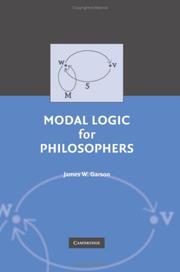
ISBN: 0521863678 0521682290 9780521863674 9780521682299 9780511617737 9780511282140 0511282141 0511617739 1139810588 9781139810586 0511281382 9780511281389 0511280963 9780511280962 0511281765 9780511281761 129931869X Year: 2006 Publisher: Cambridge New York Cambridge University Press
Abstract | Keywords | Export | Availability | Bookmark
 Loading...
Loading...Choose an application
- Reference Manager
- EndNote
- RefWorks (Direct export to RefWorks)
Designed for use by philosophy students, this 2006 book provides an accessible, yet technically sound treatment of modal logic and its philosophical applications. Every effort has been made to simplify the presentation by using diagrams in place of more complex mathematical apparatus. These and other innovations provide philosophers with easy access to a rich variety of topics in modal logic, including a full coverage of quantified modal logic, non-rigid designators, definite descriptions, and the de-re de-dictio distinction. Discussion of philosophical issues concerning the development of modal logic is woven into the text. The book uses natural deduction systems and also includes a diagram technique that extends the method of truth trees to modal logic. This feature provides a foundation for a novel method for showing completeness, one that is easy to extend to systems that include quantifiers.
Modality (Logic) --- Modalité (Logique) --- Modaliteit (logica) --- Modaliteit (logica). --- Modalité (Logique) --- Modal logic --- Logic --- Nonclassical mathematical logic --- Bisimulation --- Arts and Humanities --- Philosophy --- Modalité (logique) --- Manuels d'enseignement supérieur
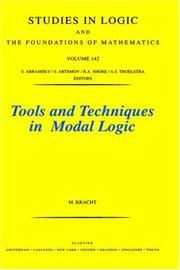
ISBN: 0444500553 9780444500557 Year: 1999 Volume: v. 142 Publisher: Amsterdam New York Elsevier
Abstract | Keywords | Export | Availability | Bookmark
 Loading...
Loading...Choose an application
- Reference Manager
- EndNote
- RefWorks (Direct export to RefWorks)
This book treats modal logic as a theory, with several subtheories, such as completeness theory, correspondence theory, duality theory and transfer theory and is intended as a course in modal logic for students who have had prior contact with modal logic and who wish to study it more deeply. It presupposes training in mathematical or logic. Very little specific knowledge is presupposed, most results which are needed are proved in this book.
Modaliteit (Logica) --- Modality (Logic) --- Modalité (Logique) --- Modale logica. --- Mathematics --- Mathematical Theory --- Physical Sciences & Mathematics --- Modal logic --- Logic --- Nonclassical mathematical logic --- Bisimulation
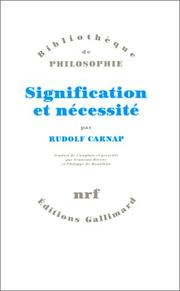
ISBN: 2070740196 9782070740192 Year: 1997 Volume: *18 Publisher: Paris Gallimard
Abstract | Keywords | Export | Availability | Bookmark
 Loading...
Loading...Choose an application
- Reference Manager
- EndNote
- RefWorks (Direct export to RefWorks)
Lexicology. Semantics --- Mathematical logic --- Betekenis (Filosofie) --- Meaning (Philosophy) --- Modaliteit (Logica) --- Modality (Logic) --- Modalité (Logique) --- Semantics (Philosophy) --- Semantiek (Filosofie) --- Signification (Philosophie) --- Sémantique (Philosophie) --- Positivisme logique --- --Sémantique --- --Lexicology. Semantics --- --Betekenis (Filosofie) --- Sémantique (Philosophie) --- Modalité (Logique) --- --Semantics (Philosophy) --- --Meaning (Philosophy) --- Logique mathématique --- Modalité (logique) --- Sémantique (philosophie) --- Sémantique --- Carnap, rudolf (1891-1970) --- Nécessité --- Philosophie analytique --- Signification (philosophie)
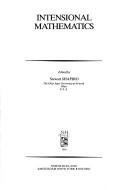
ISBN: 0444876324 9780444876324 9781435686977 1435686977 1281716464 9786611716462 9780080880022 0080880045 Year: 1985 Volume: 113 Publisher: Amsterdam : North-Holland,
Abstract | Keywords | Export | Availability | Bookmark
 Loading...
Loading...Choose an application
- Reference Manager
- EndNote
- RefWorks (Direct export to RefWorks)
``Platonism and intuitionism are rival philosophies of Mathematics, the former holding that the subject matter of mathematics consists of abstract objects whose existence is independent of the mathematician, the latter that the subject matter consists of mental construction... both views are implicitly opposed to materialistic accounts of mathematics which take the subject matter of mathematics to consist (in a direct way) of material objects...'' FROM THE INTRODUCTIONAmong the aims of this book are: - The discussion of some important philosophical issues using the precision
Mathematical logic --- Modality (Logic) --- Constructive mathematics. --- Intuitionistic mathematics. --- Constructive mathematics --- Intuitionistic mathematics --- Constructie [Wiskunde]. (Versch. onderwerpen) --- Modaliteit [Logica]. (Versch. onderwerpen) --- Mathématiques intuitionnistes. (Mélanges) --- Construction [Mathématiques]. (Mélanges) --- Modalité [Logique]. (Mélanges) --- Wiskunde (Intuitionistische). (Versch. onderwerpen) --- Mathematics --- Mathematics, Constructive --- Logic, Symbolic and mathematical --- Modal logic --- Logic --- Nonclassical mathematical logic --- Bisimulation
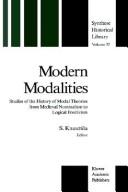
ISBN: 9027726787 9401078122 9400929153 9789401078122 Year: 1988 Volume: vol 33 Publisher: Dordrecht Boston Lancaster Reidel
Abstract | Keywords | Export | Availability | Bookmark
 Loading...
Loading...Choose an application
- Reference Manager
- EndNote
- RefWorks (Direct export to RefWorks)
The word "modem" in the title of this book refers primarily to post-medieval discussions, but it also hints at those medieval mo dal theories which were considered modem in contradistinction to ancient conceptions and which in different ways influenced philosophical discussions during the early modem period. The me dieval developments are investigated in the opening paper, 'The Foundations of Modality and Conceivability in Descartes and His Predecessors', by Lilli Alanen and Simo Knuuttila. Boethius's works from the early sixth century belonged to the sources from which early medieval thinkers obtained their knowledge of ancient thought. They offered extensive discus sions of traditional modal conceptions the basic forms of which were: (1) the paradigm of possibility as a potency striving to realize itself; (2) the "statistical" interpretation of modal no tions where necessity means actuality in all relevant cases or omnitemporal actuality, possibility means actuality in some rel evant cases or sometimes, and impossibility means omnitemporal non-actuality; and (3) the "logical" definition of possibility as something which, being assumed, results in nothing contradic tory. Boethius accepted the Aristotelian view according to which total possibilities in the first sense must prove their met tle through actualization and possibilities in the third sense are assumed to be realized in our actual history. On these presump tions, all of the above-mentioned ancient paradigms imply the Principle of Plenitude according to which no genuine possibility remains unrealized.
Modality (Logic) --- -Modality (Theory of knowledge) --- -Knowledge, Theory of --- Modal logic --- Logic --- Nonclassical mathematical logic --- Bisimulation --- History --- -History --- Modaliteit [Logica]. Geschiedenis. --- Modalité [Philosophie]. Histoire. --- Modalité [Logique]. Histoire. --- Modaliteit [Filosofie]. Geschiedenis. --- Modality (Theory of knowledge) --- Knowledge, Theory of --- Philosophy (General) --- Philosophy, Modern
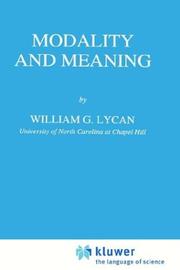
ISBN: 0792330064 0792330072 9401109362 9780792330066 Year: 1994 Volume: 53 Publisher: Dordrecht Kluwer Academic
Abstract | Keywords | Export | Availability | Bookmark
 Loading...
Loading...Choose an application
- Reference Manager
- EndNote
- RefWorks (Direct export to RefWorks)
Lexicology. Semantics --- Philosophy of language --- Metafysica --- Metaphysics --- Modaliteit (Logica) --- Modality (Logic) --- Modalité (Logique) --- Métaphysique --- Semantics --- Semantics (Philosophy) --- Semantiek --- Semantiek (Filosofie) --- Sémantique --- Sémantique (Philosophie) --- Sémasiologie --- Language and languages --- Langage et langues --- Philosophy --- Philosophie --- -Modality (Logic) --- Intension (Philosophy) --- Logical semantics --- Semantics (Logic) --- Semeiotics --- Significs --- Syntactics --- Unified science --- Logic, Symbolic and mathematical --- Logical positivism --- Meaning (Psychology) --- Philosophy, Modern --- Semiotics --- Signs and symbols --- Symbolism --- Analysis (Philosophy) --- Definition (Philosophy) --- Formal semantics --- Semasiology --- Semiology (Semantics) --- Comparative linguistics --- Information theory --- Lexicology --- God --- Ontology --- Philosophy of mind --- Modal logic --- Logic --- Nonclassical mathematical logic --- Bisimulation --- Foreign languages --- Languages --- Anthropology --- Communication --- Ethnology --- Philology --- Linguistics --- Métaphysique --- Modalité (Logique) --- Sémantique --- Sémantique (Philosophie) --- Language and languages - Philosophy --- Modalité (linguistique) --- Modalité (logique)
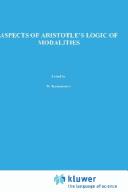
ISBN: 0792300483 9401076960 9400926510 9780792300489 Year: 1989 Volume: 35 Publisher: Deventer Kluwer university press
Abstract | Keywords | Export | Availability | Bookmark
 Loading...
Loading...Choose an application
- Reference Manager
- EndNote
- RefWorks (Direct export to RefWorks)
Modaliteit (Logica) --- Modality (Logic) --- Modalité (Logique) --- ROLDUC-SEMI --- #GROL:SEMI-1-05'-04' Aris --- Modal logic --- Logic --- Nonclassical mathematical logic --- Bisimulation --- Aristoteles --- Contributions in logic of modalities. --- Aristote --- Aristotle --- Aristotile --- Modality (Logic). --- Aristotle. --- Aristoteles. --- Contributions in logic of modalities --- Aristotle - Contributions in logic of modalities. --- Arisṭāṭṭil --- Aristo, --- Aristotel --- Aristotele --- Aristóteles, --- Aristòtil --- Arisṭū --- Arisṭūṭālīs --- Arisutoteresu --- Arystoteles --- Ya-li-shih-to-te --- Ya-li-ssu-to-te --- Yalishiduode --- Yalisiduode --- Ἀριστοτέλης --- Αριστοτέλης --- Аристотел --- ארסטו --- אריםטו --- אריסטו --- אריסטוטלס --- אריסטוטלוס --- אריסטוטליס --- أرسطاطاليس --- أرسططاليس --- أرسطو --- أرسطوطالس --- أرسطوطاليس --- ابن رشد --- اريسطو --- Pseudo Aristotele --- Pseudo-Aristotle --- アリストテレス
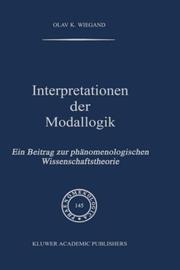
ISBN: 0792348095 9780792348092 Year: 1998 Volume: 145 Publisher: Dordrecht Kluwer
Abstract | Keywords | Export | Availability | Bookmark
 Loading...
Loading...Choose an application
- Reference Manager
- EndNote
- RefWorks (Direct export to RefWorks)
Das Buch beabsichtigt, mit den Mitteln einer phänomenologischen Semantik, einen Beitrag zum Verständnis der Modallogik und ihrer philosophischen Implikationen zu liefern. Es richtet sich in erster Linie an Phänomenologen, aber auch an analytische Philosophen und an philosophisch interessierte Logiker.Bereits im vorigen Jahrhundert begannen Mathematik und Logik, sich zu abstrakten Wissenschaften zu entwickeln. Husserl nannte die schließlich resultierende Einheit beider `Mathesis Universalis'. Diese bildet nicht nur den Boden aus dem Husserls philosophische Arbeit erwuchs, sondern auch den Rahmen, in den die moderne Modallogik zu stellen ist. Als abstrakte Disziplin der Mathesis Universalis erfordert ihre phänomenologische Aufklärung detaillierte Analysen der Genese von Modalisierung, die weit in die kognitiven Strukturen von (vorsprachlicher) Wahrnehmung hineinreichen. Das so gewonnene Verständnis von Modalisierung erbringt ein zweifaches Resultat: Zum einen kann die insbesondere im Rahmen der analytischen Philosophie geführte Diskussion der erkenntnistheoretischen und ontologischen Schwierigkeiten der Modallogik eine phänomenologische Aufklärung erfahren. Zum anderen erlaubt die Tatsache, daß der Beweisbegriff als mathematische Modalität zu verstehen ist, eine präzise phänomenologische Bestimmung des Verhältnisses von formaler Logik und Mathematik.
Fenomenologie --- Logic [Symbolic and mathematical ] --- Logica [Symbolische en wiskundige ] --- Logique symbolique et mathémathique --- Modaliteit (Logica) --- Modality (Logic) --- Modalité (Logique) --- Phenomenology --- Phénoménologie --- Logique symbolique et mathématique --- Logic, symbolic and mathematical --- Modal logic --- Nonclassical mathematical logic --- Bisimulation --- Algebra of logic --- Logic, Universal --- Symbolic and mathematical logic --- Symbolic logic --- Algebra, Abstract --- Metamathematics --- Syllogism --- Phenomenology. --- Modality (Logic). --- Modalité (Logique) --- Logique symbolique et mathématique --- Phénoménologie --- Logic, Symbolic and mathematical --- Science --- Philosophy, Modern --- Logic --- Mathematical logic --- Mathematics --- Set theory --- Normal science --- Philosophy of science --- Philosophy --- Theory of knowledge --- Logic, Symbolic and mathematical. --- Philosophy. --- Sciences --- Philosophie --- Science - Philosophy --- Logique modale
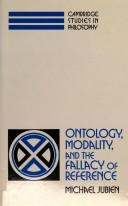
ISBN: 0521433991 9780521433990 Year: 1993 Volume: *8 Publisher: Cambridge Cambridge University Press
Abstract | Keywords | Export | Availability | Bookmark
 Loading...
Loading...Choose an application
- Reference Manager
- EndNote
- RefWorks (Direct export to RefWorks)
Metaphysics --- Theory of knowledge --- Being --- Eidos --- Eigennamen --- Essence (Philosophie) --- Essence (Philosophy) --- Essentialism (Philosophy) --- Essentialisme (Filosofie) --- Essentialisme (Philosophie) --- Essentie (Filosofie) --- Etre (Philosophie) --- Identiteit (Filosofie) --- Identiteit (Filosofisch begrip) --- Identity (Philosophical concept) --- Identité (Concept philosophique) --- Identité (Philosophie) --- Modaliteit (Logica) --- Modality (Logic) --- Modalité (Logique) --- Même (Philosophie) --- Mêmeté (Philosophie) --- Namen --- Names --- Necessity (Philosophy) --- Noms --- Noms propres --- Noodzakelijkheid (Filosofie) --- Nécessité (Philosophie) --- Ontologie --- Ontology --- Principe d'identité --- Proper names --- Reference (Philosophie) --- Reference (Philosophy) --- Referentie (Filosofie) --- Verwijzing (Filosofie) --- Zijn (Filosofie) --- Zijnsleer --- Names. --- Ontology. --- Identity --- Modal logic --- Logic --- Nonclassical mathematical logic --- Bisimulation --- Philosophy --- Substance (Philosophy) --- Causation --- Chance --- Fate and fatalism --- Teleology --- Truth --- Comparison (Philosophy) --- Resemblance (Philosophy) --- Nomenclature --- Terminology --- Epithets --- Language and languages --- Referring, Theory of --- Theory of referring --- Etymology --- Essentialism (Philosophy). --- Identity (Philosophical concept). --- Modality (Logic). --- Necessity (Philosophy). --- Reference (Philosophy). --- Modalité (logique) --- Essentialisme (doctrine de la spiritualité vivante) --- Nécessité (philosophie) --- Personne (philosophie) --- Référence (philosophie)
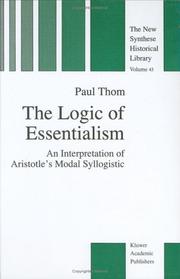
ISBN: 0792339878 9401072442 9400916639 Year: 1996 Volume: 43 Publisher: Dordrecht Boston London Kluwer Academic Publishers
Abstract | Keywords | Export | Availability | Bookmark
 Loading...
Loading...Choose an application
- Reference Manager
- EndNote
- RefWorks (Direct export to RefWorks)
Ancient logic --- Antieke logica --- Argumentation (Logic) --- Eidos --- Essence (Philosophie) --- Essence (Philosophy) --- Essentialism (Philosophy) --- Essentialisme (Filosofie) --- Essentialisme (Philosophie) --- Essentie (Filosofie) --- Logic [Ancient ] --- Logica [Antieke ] --- Logica van de Oudheid --- Logique ancienne --- Logique de l'Antiquité --- Modaliteit (Logica) --- Modality (Logic) --- Modalité (Logique) --- Sluitrede --- Syllogism --- Syllogisme --- Logic, Ancient --- Argumentation --- Logic --- Reasoning --- Logic, Symbolic and mathematical --- Modal logic --- Nonclassical mathematical logic --- Bisimulation --- Philosophy --- Substance (Philosophy) --- Aristoteles --- Contributions in modal syllogistic. --- Aristote --- Aristotle --- Aristotile --- Aristotle. --- Aristoteles. --- Contributions in modal syllogistic --- Aristotle - Contributions in modal syllogistic. --- Arisṭāṭṭil --- Aristo, --- Aristotel --- Aristotele --- Aristóteles, --- Aristòtil --- Arisṭū --- Arisṭūṭālīs --- Arisutoteresu --- Arystoteles --- Ya-li-shih-to-te --- Ya-li-ssu-to-te --- Yalishiduode --- Yalisiduode --- Ἀριστοτέλης --- Αριστοτέλης --- Аристотел --- ארסטו --- אריםטו --- אריסטו --- אריסטוטלס --- אריסטוטלוס --- אריסטוטליס --- أرسطاطاليس --- أرسططاليس --- أرسطو --- أرسطوطالس --- أرسطوطاليس --- ابن رشد --- اريسطو --- Pseudo Aristotele --- Pseudo-Aristotle --- アリストテレス
| Listing 1 - 10 of 10 |
Sort by
|

 Search
Search Feedback
Feedback About UniCat
About UniCat  Help
Help News
News